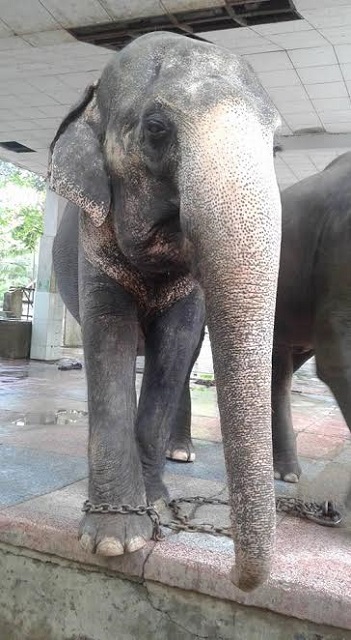I stood by the fence and watched her swaying back and forth, the chain across her leg banging in rhythm.
Sunglasses masked the tears in my eyes. I was sick to my stomach, but I refused to look away.
I traveled to Myanmar for this, to see Mo Mo in person.
When I first heard of Mo Mo a year ago—on my birthday, which I share with her—I knew I had to do something.
For 62 years, this poor elephant had been performing for visitors at the Yangon Zoo. Seeing the images of her dressed in a party outfit and dancing was enough for me to know she needed help.
Petitions were written and signed; money was raised in hope of sending her to a sanctuary so she could finally retire and be free. The money was given to a sanctuary committed to freeing Mo Mo, but our pleas fell upon deaf ears.
People love Mo Mo, and travel from all over Myanmar to feed her sugarcane and see her shimmy a little.
She remains on a platform with six other elephants, and the two days I spent there, she was unable to reach water and was given little food.
My friend (and fellow elephant advocate) has come to this zoo her whole life, not because she enjoys seeing them there, but because she knows they need to feel love.
“Why is she chained?” we asked one of the elephant caretakers
“She was upset with the little one,” was the response.
Who am I in the eyes of the locals? Just a tourist—an American who comes to place blame and judgement on them for Mo Mo’s sadness?
When I started the petitions to Free Mo Mo, I promised myself I’d see her retired by our next birthday. That day has come and gone, and Mo Mo performed as usual on her birthday, as birds were released from cages in her honor.
These situations are all too common for elephants throughout Asia. Many, like Mo Mo, will never have the chance to just be elephants.
Tourism is changing. People are seeing the truth, which is that there are ways to see elephants running in the grass and swimming in the water, and not confined to one area, chained there day after day.
Ecotourism is that change. I encourage anyone who wants the experience of a lifetime—to see an elephant—to go where you can walk with them, not ride on them. Go where they are basking in the sun, eating fresh fruit and vegetables, not waiting for someone to feed them those bits of sugarcane.
Ecotourism is tourism directed toward exotic, often threatened, natural environments—especially making an effort to support conservation observe wildlife.
There are many sanctuaries throughout Southeast Asia that practice this, as well as providing a source of income for the Karen people, so they do not have to rely on various ways of working the elephants. Tourists come to see and care for the elephants, while learning about the Karen culture.
Elephants are such majestic and smart creatures. Those like Mo Mo deserve the chance to live out the rest of their lives as close to the wild as they can.
They deserve to have a bit of happiness, especially since they have given us so many happy memories.
Before I left the zoo, I told Mo Mo I will return to Yangon someday, to be there when she is finally given a new home and the rest she has deserved for so long.
I will not give up on her.
~
Author: Tiffany Parker
Image: Author’s own
Editor: Yoli Ramazzina







Read 1 comment and reply